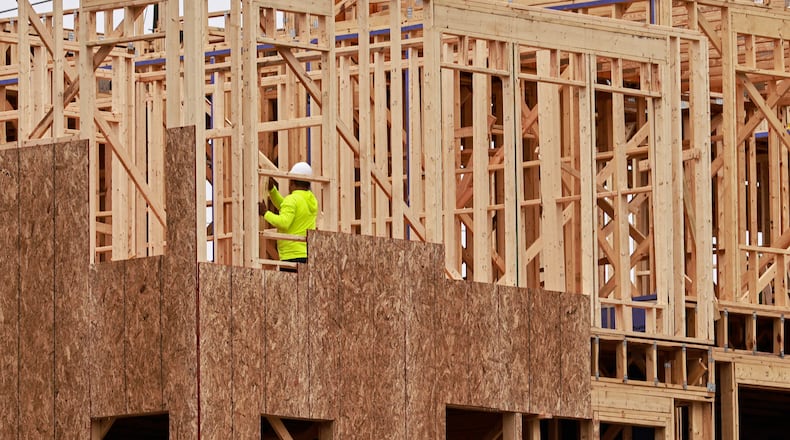With mortgage rates near 20-year highs and relatively few homes listed for sale, the Atlanta-area housing market in August reached something of a precarious — and possibly temporary — plateau with prices rising, but slowly.
The median price of a home sold last month was $404,000, according to data released this week by the Georgia Multiple Listing Service.
That was just 1% higher than in July and only 2.3% above the median price of a home sold a year earlier, compared to double-digit increases for previous years, said John Ryan, chief marketing officer of the Georgia MLS.
The dampener on price hikes has been mortgage rates, pushed higher by the Federal Reserve’s campaign to tame inflation by raising borrowing costs.
When that changes, the market will see a flood of buying, predicted broker Kristen Jones, owner of Re/Max Around Atlanta. “Eventually, the Fed will stop, and mortgage rates will come down. At that point, we expect the floodgates to open.”
But right now, those gates are high and they’re holding.
The average rate for a 30-year mortgage was 7.18% at the end of August, the highest it has been since March 2002, according to the Federal Home Loan Mortgage Corp., which insures loans in secondary markets.
Many who do buy now are betting that can’t continue, Jones said. “Buyers crossing their fingers that they can refinance in the next few years.”
Higher rates not only make monthly payments dramatically higher for new buyers, they freeze many potential sellers who don’t want to trade their current low rates for a high rate if they move, Jones said. “Sellers are not motivated to list. About 61% of all outstanding mortgages have an interest rate below 4%.”
With so many potential sellers standing pat, inventory — that is, the number of homes listed for sale — was 12.1% lower in August than it was a year earlier, according to the Georgia MLS.
Fewer than 11,000 homes in the region were listed for sale, which represents barely two months of sales. In a healthy, balanced market, the inventory level should represent at least six months of sales.
Part of the problem is an overall housing shortage in metro Atlanta.
After years of exuberant overbuilding, construction came to a virtual halt during the 2007-09 recession and has never regained its previous pace despite the region’s population growth. Since 2012, the shortage — and the flow of millennials into the market — has kept home prices rising, which increasingly made affordability an issue.
Then came the pandemic, which roiled expectations about commuting and home offices, and spurred federal efforts to protect household finances by driving interest rates down to historic lows and pumping money into the economy.
The rebound from the pandemic has meant rapid job growth, along with higher pay for many.
But at least until recently, Atlanta home price gains far outpaced income growth. That made down-payments for homes a challenge, shoving many potential buyers out of the market.
Demand for housing has spurred construction, most of it well outside the city of Atlanta. Even so, high land prices and various zoning restrictions have made construction for first-time buyers rare.
In Alpharetta, Blue River Lifestyle Communities this week announced a 24-unit development that includes both townhomes and single-family houses. The homes will be listed at $1.3 million or more.
Nearly 80% of baby boomers own a home, but only about half of the nation’s millennials do, according to national brokerage Redfin. About 1 of every 5 millennials say they don’t think they’ll ever be able to afford one, according to a Redfin poll.
But at least renters have also seen a moderation in the market. Metro Atlanta’s median rent is $2,127 a month, according to Rent.com, which tracks rentals nationally. That is virtually unchanged from a year ago, the group said.
And rate hikes are also biting homeowners who stay put.
The Fed’s campaign ripples through to virtually all borrowing, from car loans to credit cards. So even homeowners with low-rate mortgages will pay more than before if they want to tap their mortgage for a loan, said Andy Walden, vice president of research at Black Knight, a real estate analysis firm recently purchased by Atlanta-based Intercontinental Exchange.
Nationally, mortgage holders withdrew $39 billion in equity from their homes in the second quarter of this year, which is only about half as much as before interest rates started to climb, he said. “Rising rates are having a clear impact on how — and how much — equity mortgage holders are willing to withdraw from their homes.”
Metro Atlanta housing market, August
Median sales price: $404,000
Number of sales: 5,299
Number of homes listed for sale: 10,927
Price compared to year earlier: up 2.3%
Sales compared to year earlier: down 15.8%
Price compared to January 2020: up 50%
Average rate, 30-year, fixed-rate mortgage
Aug. 31, 2023: 7.18%
Aug. 31, 2022: 5.66%
Aug. 31, 2021: 2.87%
Aug. 31, 2020: 2.91%
High since 1999: 8.64% (May 2000)
Last time above 7%: March 29, 2002
Source: Georgia Multiple Listing Service, S&P Case Shiller Index, Federal Home Loan Mortgage Corp.
___________________
About the Author





